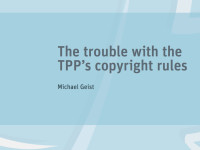As students across Canada head back to school this week, the Canadian Association of Research Libraries (CARL), which represents 31 member libraries, issued a reminder that Canadian education spends hundreds of millions of dollars every year on content licensing. Access Copyright and the publishing community have tried to paint the Canadian situation as a free-for-all, but the reality is that educational institutions, libraries, and students are still buying books and licensing content. In fact, recent U.S. data shows that textbook costs are increasing far faster than any other education cost.
The CARL release states:
The 31 member libraries of the Canadian Association of Research Libraries (CARL) spent $293 million on information resources in 2014-15, demonstrating a clear commitment to accessing print and digital content legally and rewarding content owners accordingly. Universities are actively engaged in outreach to their faculty, staff, and students, educating them on their rights and responsibilities under the Copyright Act and ensuring that uses of material under copyright fall well within the provisions of the law. Where educational uses are more substantive and therefore fall outside of fair dealing, the content is either purchased to be added to licensed collections, or rights clearances are obtained and royalties are paid for these uses. Trained, knowledgeable library staff support these activities.
Some voices in the publishing community and associated lobbyists have stated in the media that the education market has evaporated as a result of users’ fair dealing rights. This is inaccurate. Universities continue to buy and to license access to published works, at substantial cost, using public funds and student tuition dollars.











